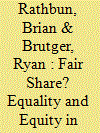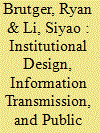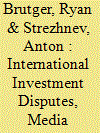|
|
|
Sort Order |
|
|
|
Items / Page
|
|
|
|
|
|
|
| Srl | Item |
| 1 |
ID:
160514


|
|
|
|
|
| Summary/Abstract |
Politicians frequently turn to reputational arguments to bolster support for their proposed foreign policies. Yet despite the prevailing belief that domestic audiences care about reputation, there is very little direct evidence that publics care about reputation costs, and very little understanding of how. We propose a dispositional theory of reputation costs in which citizens facing ill-defined strategic situations turn to their core predispositions about foreign affairs in order to weigh competing reputational dimensions. Employing a diverse array of methodological tools—from vignette-based survey experiments to automated text analysis—we show that the mass public has a “taste” for reputation, but understands it in fundamentally different ways, with hawks concerned about the negative reputational consequences of inconsistency, and doves equally concerned with the negative reputational consequences of belligerence and interventionism. In illustrating how reputation costs are in our heads, our findings offer both good and bad news for theories of reputation in IR.
|
|
|
|
|
|
|
|
|
|
|
|
|
|
|
|
| 2 |
ID:
179869


|
|
|
|
|
| Summary/Abstract |
American politicians repeatedly and strenuously invoke concerns about fairness when pitching their trade policies to their constituents, unsurprisingly since fairness is one of the most fundamental and universal moral concepts. Yet studies to date on public opinion about trade have not been designed in such a way that they test whether fairness is important, nor whether the mass public applies fairness standards impartially. Drawing on findings in social psychology and behavioral economics, we develop and find evidence for an “asymmetric fairness” argument. In a national survey of Americans, we find strong evidence that fairness, conceived in terms of equality, is crucial for understanding support for potential trade deals and support for renegotiating existing ones. Americans view as most fair and most preferable outcomes in which concessions and benefits are equal across countries, especially when those equal benefits match productivity. However, we find that Americans have an egoistically biased sense of fairness, responding particularly negatively to any outcome that leaves the United States relatively worse off—a sense of injustice that does not extend to the same degree to relative gains for Americans.
|
|
|
|
|
|
|
|
|
|
|
|
|
|
|
|
| 3 |
ID:
188827


|
|
|
|
|
| Summary/Abstract |
Domestic debates about trade have increased the salience of international economic cooperation among the public, raising the question of whether, and how, domestic support can be rallied in support of international trade agreements. We argue that institutional features of trade agreements provide important cues to domestic audiences that shape support, particularly the membership composition and voting rules for multilateral deals. We use two survey experiments to show that the US public is more supportive of trade when it is negotiated with like-minded countries. We also find that the voting rules shape support for trade agreements, but differently across partisan audiences. Republican voters strongly favor the home country having veto power, whereas Democrats prefer agreements with equal voting rules. These differences are largely driven by perceptions of the agreement’s benefit for the nation and the public’s trust of the negotiators and perceived fairness of the rules.
|
|
|
|
|
|
|
|
|
|
|
|
|
|
|
|
| 4 |
ID:
186334


|
|
|
|
|
| Summary/Abstract |
This paper puts forth a theory explaining domestic backlash against international investment law by connecting media coverage—specifically the bias in the news media’s selection of international disputes—to public opinion formation towards international agreements. To test our theory, we examine both the content and effects of the media’s reporting on international disputes, focusing on the increasingly controversial form known as investor-state dispute settlement (ISDS). We find that newspaper outlets in both the United States and Canada have a bias in favor of covering disputes filed against their home country as opposed to those filed by home country firms. Using two national survey experiments fielded in the United States and Canada, we further find that the bias in news story selection has a strong negative effect on attitudes towards ISDS and related agreements, especially among highly nationalistic individuals.
|
|
|
|
|
|
|
|
|
|
|
|
|
|
|
|
|
|
|
|
|